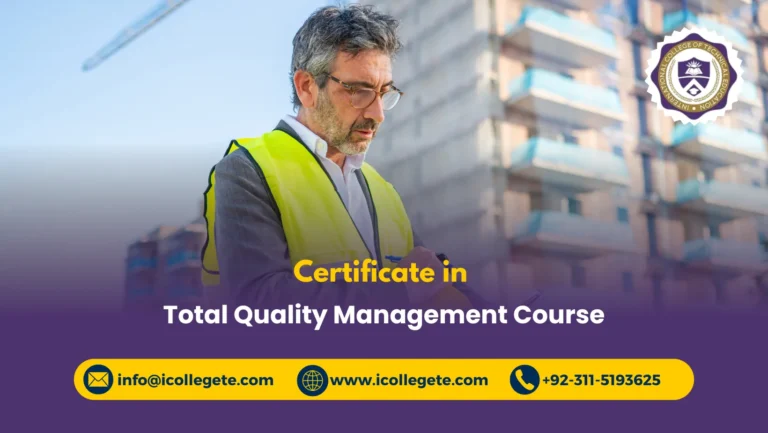The Human Resource Management (HRM) Course in Rawalpindi is a career-focused training program designed to equip learners with the essential skills and knowledge required to manage people, performance, and workplace culture effectively. Whether you’re entering the HR field or seeking to enhance your existing role, Human Resource Management Course in Rawalpindi provides a practical foundation in modern HR practices aligned with global standards.
Covering key areas such as recruitment and selection, employee relations, performance management, training and development, compensation strategies, and labor law compliance, the Human Resource Management Course in Rawalpindi prepares participants to handle real-world HR challenges with confidence. Learners gain insight into strategic HR planning, organizational behavior, and the role of HR in driving business outcomes.
Delivered by experienced instructors in Rawalpindi, the Human Resource Management Course in Rawalpindi blends theoretical instruction with case studies, role-play exercises, and interactive discussions to ensure applied learning. Human Resource Management Course in Rawalpindi is ideal for aspiring HR professionals, administrative staff, team leaders, and anyone responsible for managing people and processes in an organization.
By completing the Human Resource Management Course in Rawalpindi, participants will be able to contribute meaningfully to employee engagement, talent development, and organizational growth. Human Resource Management Course in Rawalpindi is a gateway to HR roles in corporate, public, and non-profit sectors, offering both local relevance and global career potential.
Course Overview
The Human Resource Management Course in Rawalpindi is a structured, course-level training designed to build core competencies in managing people, processes, and organizational dynamics. Comprising six targeted study units, Human Resource Management Course in Rawalpindi offers a progressive learning experience that blends foundational HR principles with practical applications across diverse workplace settings. Each unit is carefully crafted to address key areas such as workforce planning, compensation and benefits, HR metrics and analytics, employee engagement strategies, labor law essentials, and organizational development. Unlike general business courses, Human Resource Management Course in Rawalpindi focuses specifically on the human capital function, enabling learners to understand how strategic HR decisions influence productivity, culture, and long-term business success.
The six-unit format ensures a balanced approach to both operational and strategic HR responsibilities, making Human Resource Management Course in Rawalpindi ideal for professionals in administrative, supervisory, or support roles who seek formal HR training. Delivered in Rawalpindi by experienced facilitators, the Human Resource Management Course in Rawalpindi is tailored to meet the evolving needs of local and regional employers, with content that reflects current trends in talent management and workforce optimization. Whether you’re preparing for your first HR role or looking to formalize your experience with recognized training, Human Resource Management Course in Rawalpindi provides the clarity, structure, and relevance needed to thrive in today’s competitive job market. Learners will leave with actionable insights and tools to support recruitment, retention, and performance initiatives across sectors.
Course Study Units
- Workforce Planning and Talent Acquisition
- Compensation and Benefits Administration
- Employee Engagement and Retention Strategies
- HR Metrics, Analytics, and Performance Evaluation
- Labor Laws and Workplace Compliance
- Organizational Development and Change Management
Learning Outcomes for this course
Mastering Core HR Functions
- Understand the key responsibilities of human resource management in modern organizations
- Learn how to design and implement effective recruitment and selection processes
- Gain insight into employee onboarding, orientation, and integration strategies
- Explore the fundamentals of job analysis, role design, and workforce planning
- Develop skills to manage employee records and HR documentation efficiently
- Understand the importance of confidentiality and ethical standards in HR practices
- Build a foundation for managing day-to-day HR operations with professionalism
Enhancing Employee Engagement and Retention
- Learn how to assess employee satisfaction and engagement levels
- Explore strategies to improve workplace morale and team collaboration
- Understand the role of recognition, feedback, and communication in retention
- Develop programs that support employee well-being and motivation
- Identify factors contributing to high turnover and implement retention solutions
- Promote inclusive and supportive workplace culture through HR initiatives
- Align employee engagement efforts with organizational goals
Applying HR Metrics and Analytics
- Understand the use of data in evaluating HR performance and decision-making
- Learn how to track key HR indicators such as turnover, absenteeism, and productivity
- Use analytics to forecast workforce needs and talent gaps
- Apply metrics to assess training effectiveness and employee development
- Support strategic planning through data-driven HR insights
- Present HR reports to management using clear and actionable formats
- Integrate HR analytics into continuous improvement processes
Managing Compensation and Benefits
- Learn how to structure competitive compensation packages based on market standards
- Understand payroll systems, allowances, and statutory deductions
- Explore employee benefits including health, insurance, and retirement plans
- Ensure compliance with labor laws in compensation practices
- Develop reward systems that align with performance and organizational values
- Support budgeting and cost control in HR financial planning
- Communicate compensation policies clearly to employees
Navigating Labor Laws and Workplace Compliance
- Gain knowledge of key labor laws and employment regulations in Pakistan
- Understand employee rights, contracts, and termination procedures
- Learn how to handle disciplinary actions and grievance resolution
- Ensure workplace policies align with legal and ethical standards
- Prepare documentation for audits and legal reviews
- Promote compliance through training and policy enforcement
- Support risk management by identifying and addressing legal vulnerabilities
Driving Organizational Development
- Understand the role of HR in shaping organizational culture and change
- Learn how to support leadership development and succession planning
- Facilitate training programs that build workforce capabilities
- Promote innovation and adaptability through HR-led initiatives
- Align HR strategies with long-term business objectives
- Support organizational restructuring and transformation efforts
- Encourage continuous learning and professional growth among employees
Strengthening Strategic HR Planning
- Learn how to align HR goals with organizational strategy and performance targets
- Develop workforce plans that support business expansion and operational needs
- Forecast talent requirements based on market trends and internal data
- Support mergers, acquisitions, and transitions through HR planning
- Collaborate with senior management on strategic HR initiatives
- Monitor external factors affecting workforce dynamics and HR policies
- Build resilience and agility into HR systems and processes
Entry Requirements for this course
- Age Requirement
- Applicants must be at least 18 years old. This ensures maturity and readiness to engage with professional-level HR concepts and workplace scenarios.
- Educational Qualification
- Minimum education required is Matric (10th grade) or equivalent. However, candidates with Intermediate, DAE, or higher qualifications in business, commerce, or humanities are preferred.
- Work Experience
- No prior experience is mandatory, but individuals with 1–2 years in administration, office support, or supervisory roles will benefit from faster skill application and contextual understanding.
- Language Proficiency
- Basic proficiency in English or Urdu is required. Learners should be able to understand course materials, participate in discussions, and complete written assignments effectively.
- Communication Skills
- Applicants should have basic verbal and written communication abilities. This helps in understanding HR processes and interacting confidently during role-play and group activities.
- Computer Literacy
- Familiarity with MS Office (Word, Excel, PowerPoint) is recommended. HR tasks often involve documentation, reporting, and digital recordkeeping, which require basic computer skills.
- Documentation Requirements
- Candidates must submit a copy of their CNIC, academic certificates, and two passport-sized photographs. These are necessary for registration, certification, and record verification.
- Career Intent or Interest in HR
- Individuals with a genuine interest in people management, organizational development, or administrative careers are encouraged to apply. Motivation to learn and grow in HR is essential.
- Professional Conduct
- Applicants should demonstrate a respectful attitude and willingness to engage in collaborative learning. HR roles require ethical behavior and interpersonal sensitivity.
- Availability for Training
- Candidates must be able to attend scheduled classes and participate in practical sessions. Regular attendance is crucial for successful completion and certification.
Course Benefits of this course
Professional Skill Development
- Gain practical HR skills applicable across industries and organizational sizes
- Learn to manage recruitment, onboarding, and employee lifecycle processes
- Understand how to design and implement effective HR policies and procedures
- Build confidence in handling employee relations and workplace communication
- Develop skills in performance management and appraisal systems
- Learn to maintain accurate HR documentation and records
- Strengthen decision-making through structured HR planning
- Improve conflict resolution and negotiation abilities
- Prepare for HR roles with real-world relevance and operational clarity
Career Advancement Opportunities
- Qualify for entry-level and mid-level HR positions in corporate, public, and nonprofit sectors
- Enhance your resume with a recognized HRM certification
- Increase your chances of promotion within administrative or supervisory roles
- Build credentials for roles such as HR Assistant, HR Officer, or Recruitment Coordinator
- Open pathways to specialized HR functions like training, payroll, or compliance
- Gain recognition for your ability to manage people and processes effectively
- Improve your job prospects in both local and international markets
- Support career transitions into human resource management from other fields
- Strengthen your professional identity in the HR domain
Organizational Impact and Readiness
- Help organizations improve employee engagement and retention
- Support the development of inclusive and productive workplace cultures
- Contribute to strategic HR planning and workforce optimization
- Assist in aligning HR practices with business goals and performance metrics
- Promote compliance with labor laws and ethical standards
- Enhance internal communication and team collaboration
- Support organizational change and development initiatives
- Improve documentation and reporting for audits and reviews
- Foster a proactive approach to human capital management
Legal and Compliance Awareness
- Understand key labor laws and employment regulations in Pakistan
- Learn how to manage contracts, terminations, and disciplinary procedures
- Ensure HR practices align with legal and ethical standards
- Reduce organizational risk through proper documentation and policy enforcement
- Prepare for regulatory audits and legal reviews
- Promote transparency and fairness in workplace policies
- Support grievance handling and conflict resolution processes
- Build awareness of employee rights and employer obligations
- Encourage a culture of compliance and accountability
Practical and Applied Learning
- Participate in role-play exercises and case-based discussions
- Apply HR concepts to real-world scenarios and workplace challenges
- Learn through interactive sessions led by experienced trainers
- Practice preparing job descriptions, interview questions, and appraisal forms
- Use HR templates and tools for documentation and reporting
- Engage in group activities that simulate HR decision-making
- Receive feedback and guidance to improve practical competence
- Build confidence in applying HR knowledge in professional settings
- Develop hands-on skills for immediate workplace use
Cross-Functional Relevance
- Valuable for professionals in administration, operations, and team leadership roles
- Supports HR integration across departments such as finance, marketing, and logistics
- Enhances collaboration between HR and senior management
- Useful for entrepreneurs managing small teams and startups
- Supports NGO and public sector staff in managing human resources
- Builds transferable skills applicable in diverse organizational contexts
- Encourages holistic understanding of business and people management
- Prepares learners for dynamic and evolving workplace environments
- Strengthens coordination between HR and compliance functions
Certification and Recognition
- Receive a professional certificate upon successful course completion
- Certification recognized by employers and training institutions across Pakistan
- Validates your HR knowledge and practical skills
- Adds credibility to your professional profile and job applications
- Supports eligibility for further HR training and specialization
- Demonstrates commitment to professional development
- Enhances your standing in recruitment and HR networks
- Can be used to fulfill internal training requirements in organizations
- Builds trust with employers and clients in HR-related roles
Long-Term Career Value
- Establish a strong foundation for lifelong learning in human resource management
- Support future specialization in recruitment, training, or HR analytics
- Contribute to organizational growth through effective people management
- Promote ethical leadership and responsible HR practices
- Build resilience and adaptability in managing workforce challenges
- Encourage innovation in HR systems and employee engagement
- Strengthen your role in shaping workplace culture and performance
- Position yourself as a strategic partner in organizational success
- Prepare for evolving HR trends and digital transformation in the workplace
Who Should Enroll in this course
- Fresh Graduates in Business or Social Sciences Individuals who have recently completed degrees or diplomas in business administration, sociology, psychology, or public administration and want to enter the HR field.
- DAE and Intermediate-Level Students Candidates with DAE or FA/FSc qualifications seeking to build practical HR skills for administrative or support roles in organizations.
- Office Administrators and Clerical Staff Employees handling documentation, staff coordination, or internal communication who want to formalize their HR knowledge and expand their responsibilities.
- Team Leaders and Supervisors Professionals managing small teams who need to understand HR principles to improve performance, resolve conflicts, and support staff development.
- Aspiring HR Professionals Individuals aiming to start a career in human resources and looking for structured, foundational training in recruitment, employee relations, and compliance.
- HR Assistants and Junior HR Officers Entry-level HR staff who want to upgrade their skills and prepare for more advanced roles in talent management and organizational development.
- Small Business Owners and Entrepreneurs Business owners managing their own teams who need to understand HR policies, labor laws, and employee engagement strategies.
- NGO and Development Sector Staff Personnel working in non-profit organizations who handle recruitment, training, or staff welfare and require HRM knowledge for better program delivery.
- Public Sector Employees Government staff involved in administration, human resources, or departmental coordination who need HR training to improve service delivery.
- Corporate Trainers and Facilitators Professionals delivering training programs who want to align their content with HR development frameworks and employee learning needs.
- Payroll and Compensation Officers Individuals managing salaries, benefits, and allowances who need to understand HR systems and legal compliance in compensation.
- Recruitment Consultants and Freelancers Independent professionals offering hiring services who want to strengthen their understanding of structured recruitment and selection processes.
- Customer Service and Front Desk Staff Employees interacting with staff and clients who benefit from HR knowledge to handle queries, complaints, and internal coordination.
- Legal and Compliance Officers Professionals working in legal departments who need to understand HR policies, labor laws, and employee rights to support organizational compliance.
- HR Software Users and Data Entry Operators Individuals using HRMS or ERP systems who want to understand the HR context behind the data they manage and report.
- Career Switchers from Non-HR Fields Professionals from finance, marketing, or operations seeking a transition into human resource management through formal training.
- Academic and Vocational Instructors Teachers and trainers who want to incorporate HRM content into their curriculum or offer HR-related guidance to students.
- Interns and Trainees in Administrative Roles Young professionals gaining experience in office environments who want to build HR competencies for future career growth.
- HR Department Support Staff Individuals assisting HR teams with logistics, documentation, or coordination who want to understand the full scope of HR functions.
- Anyone Interested in People Management Motivated learners who enjoy working with people and want to develop skills in managing teams, resolving conflicts, and improving workplace culture.
Future Progression of this course
Progression to Advanced HR Certifications
- Enroll in professional certifications such as Certified Human Resource Professional (CHRP) or PHRi
- Pursue short courses in HR analytics, payroll management, or employee relations
- Attend workshops on strategic HR planning and organizational development
- Gain credentials in specialized areas like talent acquisition or performance appraisal systems
- Prepare for international HR certifications recognized by global employers
- Build eligibility for roles requiring formal HR compliance and audit training
- Strengthen your profile for freelance HR consultancy or contract-based HR support
- Explore continuing education in employment law and workplace ethics
Transition into Specialized HR Roles
- Move into focused roles such as Recruitment Coordinator or Training and Development Officer
- Take on responsibilities in compensation and benefits administration
- Support employee wellness and engagement programs as an HR facilitator
- Join diversity and inclusion teams to promote equitable workplace practices
- Handle grievance resolution and disciplinary procedures as an HR advisor
- Manage HR documentation and compliance reporting for audits
- Coordinate onboarding and orientation programs for new hires
- Assist in workforce planning and succession strategy development
Advancement in Administrative and Supervisory Positions
- Qualify for promotion to Office Manager or Department Coordinator roles
- Oversee staff scheduling, leave management, and internal communications
- Support policy implementation and procedural updates across departments
- Manage small teams with improved leadership and HR knowledge
- Contribute to performance reviews and staff development planning
- Handle confidential employee data and maintain HR records
- Collaborate with senior management on staffing and operational needs
- Improve workplace efficiency through structured HR practices
Entry into HR Support and Consultancy Services
- Offer freelance HR services to small businesses and startups
- Assist organizations with recruitment, documentation, and compliance setup
- Provide training sessions on HR policies and employee engagement
- Support NGOs and educational institutions with HR planning and staff coordination
- Build a portfolio of HR support projects across sectors
- Deliver HR orientation programs for new employees
- Help businesses prepare for labor inspections and HR audits
- Advise on basic HR software implementation and usage
Integration into Organizational Development Functions
- Contribute to change management and restructuring initiatives
- Support leadership development and team-building programs
- Assist in aligning HR strategies with business growth objectives
- Promote continuous learning and professional development within teams
- Facilitate internal communication and feedback systems
- Help design performance improvement plans and KPIs
- Encourage innovation in HR systems and employee support
- Participate in organizational culture enhancement efforts
Expansion into Training and Facilitation Roles
- Conduct HR-related workshops and seminars for staff and trainees
- Develop training materials on recruitment, compliance, and employee relations
- Mentor junior HR staff and interns in workplace settings
- Support onboarding and induction programs for new hires
- Deliver soft skills and communication training aligned with HR goals
- Collaborate with training departments on curriculum development
- Promote awareness of labor laws and ethical HR practices
- Build recognition as an HR trainer or facilitator in your organization
Opportunities in HR Technology and Systems
- Learn to operate HRMS and ERP platforms for employee data management
- Support digital transformation of HR processes in your organization
- Assist in automating payroll, attendance, and performance tracking systems
- Contribute to HR software selection and implementation projects
- Train staff on using HR tools for reporting and analytics
- Maintain digital records and ensure data protection compliance
- Monitor system-generated HR metrics for decision-making
- Help integrate HR technology with other business functions
Pathway to Strategic HR Involvement
- Participate in workforce planning and talent forecasting initiatives
- Contribute to policy development and organizational strategy sessions
- Support HR budgeting and resource allocation processes
- Collaborate with leadership on employee engagement and retention strategies
- Provide input on succession planning and leadership pipeline development
- Align HR goals with operational and financial targets
- Promote ethical decision-making and inclusive workplace practices
- Strengthen your role as a strategic contributor to organizational success
Conclusion
The Human Resource Management Course in Rawalpindi is more than a stepping stone—it’s a strategic launchpad for individuals ready to influence how organizations grow, adapt, and thrive through people. In today’s competitive landscape, success isn’t just about systems or products; it’s about how well teams are built, supported, and led. Human Resource Management Course in Rawalpindi empowers learners to become the architects of workplace culture, equipping them with the mindset and tools to foster collaboration, accountability, and continuous improvement.
What sets Human Resource Management Course in Rawalpindi apart is its relevance to real-world challenges. Human Resource Management Course in Rawalpindi doesn’t just teach HR theory—Human Resource Management Course in Rawalpindi cultivates practical thinking, ethical judgment, and operational clarity. Participants learn to navigate the human side of business with confidence, whether they’re resolving conflicts, supporting change, or aligning people with purpose.
For those seeking meaningful roles in organizational development, employee support, or administrative leadership, Human Resource Management Course in Rawalpindi offers a clear and actionable path forward. Human Resource Management Course in Rawalpindi ideal for learners who value structure, impact, and the ability to make informed decisions that benefit both employees and employers.
By completing the Human Resource Management Course in Rawalpindi, you position yourself not just as an HR practitioner—but as a catalyst for positive change. It’s a commitment to professional excellence and a future built on people-first leadership.
Take the Next Step Toward Human Resource Management Course in Rawalpindi – Enroll Now




